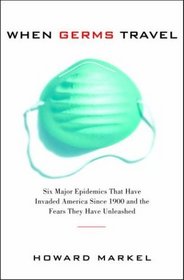Search -
When Germs Travel : Six major epidemics that have invaded America since 1900 and the fears they have unleashed
When Germs Travel Six major epidemics that have invaded America since 1900 and the fears they have unleashed
Author:
The struggle against deadly microbes is endless. Scourges that have plagued human beings since the ancients still threaten to unleash themselves; new maladies are brewing that have yet to make their appearance in the headlines; lethal germs employed as weapons of warfare and terrorism have reemerged as a worldwide menace. Regardless of their mod... more »
Author:
The struggle against deadly microbes is endless. Scourges that have plagued human beings since the ancients still threaten to unleash themselves; new maladies are brewing that have yet to make their appearance in the headlines; lethal germs employed as weapons of warfare and terrorism have reemerged as a worldwide menace. Regardless of their mod... more »
ISBN-13: 9780375420955
ISBN-10: 0375420959
Publication Date: 5/11/2004
Pages: 288
Rating: 2
ISBN-10: 0375420959
Publication Date: 5/11/2004
Pages: 288
Rating: 2
4.5 stars, based on 2 ratings
Genres:
- History >> Americas >> United States >> 20th Century >> General
- Health, Fitness & Dieting >> Personal Health >> General
- Health, Fitness & Dieting >> General
- Medicine >> Special Topics >> History
- Medicine >> Internal Medicine >> Infectious Disease >> Communicable Diseases
- Medical Books >> Medicine >> Internal Medicine >> Infectious Disease




